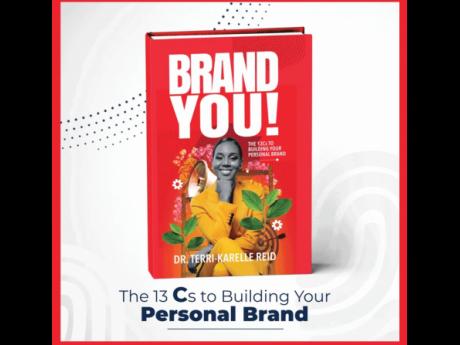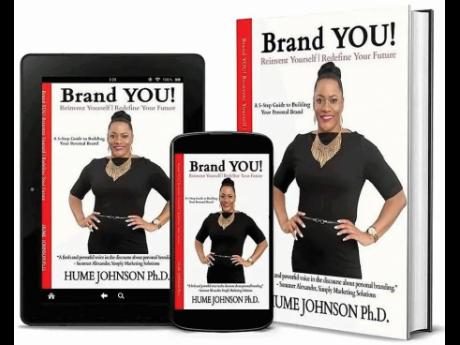Book branding stirs unease between Jamaican authors
A title dispute is brewing following the soft launch of media personality Dr Terri-Karelle Reid’s book BRAND YOU!, which bears the exact name of Dr Hume Johnson’s published four years ago. Johnson, an associate professor of communications at Roger...
A title dispute is brewing following the soft launch of media personality Dr Terri-Karelle Reid’s book BRAND YOU!, which bears the exact name of Dr Hume Johnson’s published four years ago.
Johnson, an associate professor of communications at Roger Williams University School of Law in Rhode Island, has called Reid’s decision to use the same title lamentable.
“I am surprised to see a book title, BRAND YOU!, identical to the one I authored more than four years in ago in 2018. It’s especially regrettable as I am also a Jamaican author who has published and done significant work in the area of personal branding for over 20 years,” Johnson, a personal branding strategist, told The Gleaner on Wednesday.
Acknowledging that book titles are not copyrightable, Johnson said authors often strive to differentiate their titles to establish their brand, voice, and identity in the marketplace.
“To see the identical title of my book, down to the exclamation mark, is unfortunate,” she said, adding that settling on the right title can be tedious.
Johnson said research for a title that is original, compelling, and memorable is critical to “avoiding these kinds of situations”.
The associate professor said Reid’s book has the potential to confound the audience, with the contents of both publications bearing title similarities.
“Further, the author of the book in question has strong recognition in Jamaica. Research shows this to be a strong premise on which to guarantee marketability and sale of one’s book,” she said.
“I find her choice to replicate an existing title by a colleague Jamaican author regrettable. But I do wish her the best with the publication.”
Reid, an event host and social media influencer, declined to comment on the issue first raised by Johnson on social media.
COMPETITIVE SPACE
Johnson’s Brand YOU! Reinvent Yourself, Redefine Your Future: A 5-Step Guide to Building Your Personal Brand is marketed as a useful tool to help its readers define the key variables that shape their image, creating a compelling personal brand.
Meanwhile, Reid’s BRAND YOU! The 13Cs to Building Your Personal Brand is positioned as a blueprint that has helped people and brands to deliver real influence.
“The lesson here is that authors really have to do their research. Authors have to market themselves because the space is competitive,” Latoya West Blackwood, Reid’s consultant publicist, told The Gleaner when contacted.
“If your value proposition for a competition is going to just be the title of it, then that leaves much to be desired. The title is one component of what will make the book stand out. There are several other things that go into the whole package.”
West Blackwood said design and content are also core factors that burnish a book’s global competitiveness.
“If you do a simple Google search, there are several publications that bear the same main title. It is absolutely not something that is unheard of in publishing,” she said.
NO PROTECTION
The Jamaican Copyright Licensing Agency (JAMCOPY), in response to a Gleaner query, noted that while book titles can be protected as intellectual property, they generally cannot be shielded by copyright.
JAMCOPY’s Assistant General Manager Philippa Davies explained that copyright is a property right that protects original literary, artistic, musical, and dramatic works.
She said rights holders enjoy exclusive power over their works for the duration of their lifetime, in addition to 95 years after death in Jamaica, though several other countries allow lifetime protection plus 50 years.
Davies said that protection does not extend to an idea, concept, process, principle, procedure, system, or discovery or things of a similar nature, according to Section 6(8) of the 1993 Jamaica Copyright Act.
“Copyright does not protect an idea, but a person’s original expression of an idea. It is expected that a literary work will have some length to it. A book title expresses an idea of the content or theme of the book, but the title is not the full message of the book.
“The short combination of words might be part of everyday speech and would be unjustifiable, even impractical, to grant exclusive ownership over a short combination of words so as to prevent others from using it, copying it, or having to seek permission to use the phrase,” she said.
Additionally, Davies said a witty title may well demonstrate originality, but its brevity disqualifies it from copyright protection as a literary work.
“Should a title be of such a length and substance, a claim could be made for protection as a literary work,” she said.
The JAMCOPY assistant general manager said that an author may, in some instances, seek a trademark, depending on the objectives of the creator and any planned commercial use of the title.
Davies pointed to a 2020 court ruling in India – K. Balaji Kumar v M/S. Star Polaris – which confirmed the principle that copyright protection would not extend to book titles. However, legal protection could be sought in trademark and/or unfair competition.
The court also suggested that titles of a series of literary works, including books, newspapers, and periodicals, may enjoy protection as trademarks.


